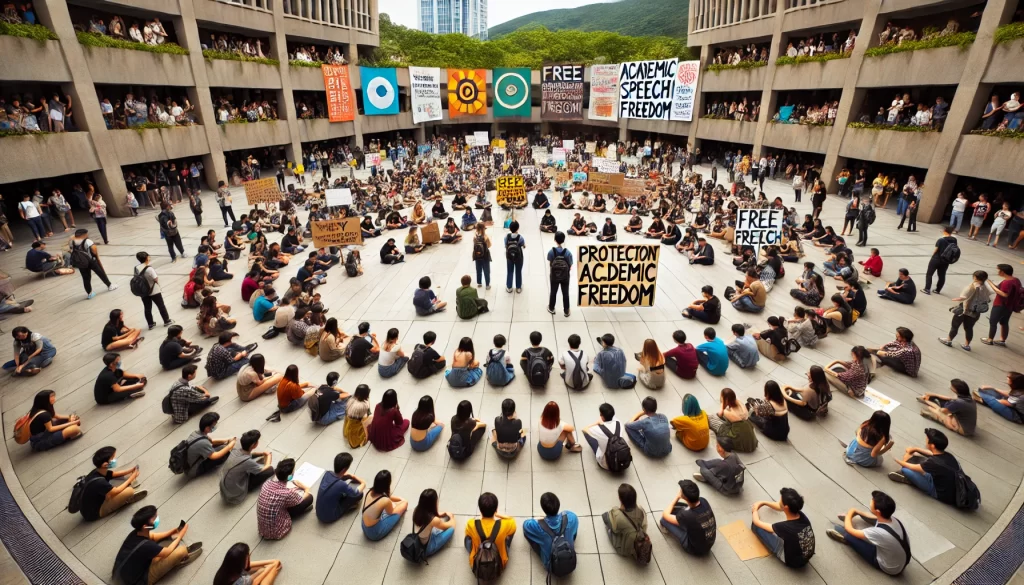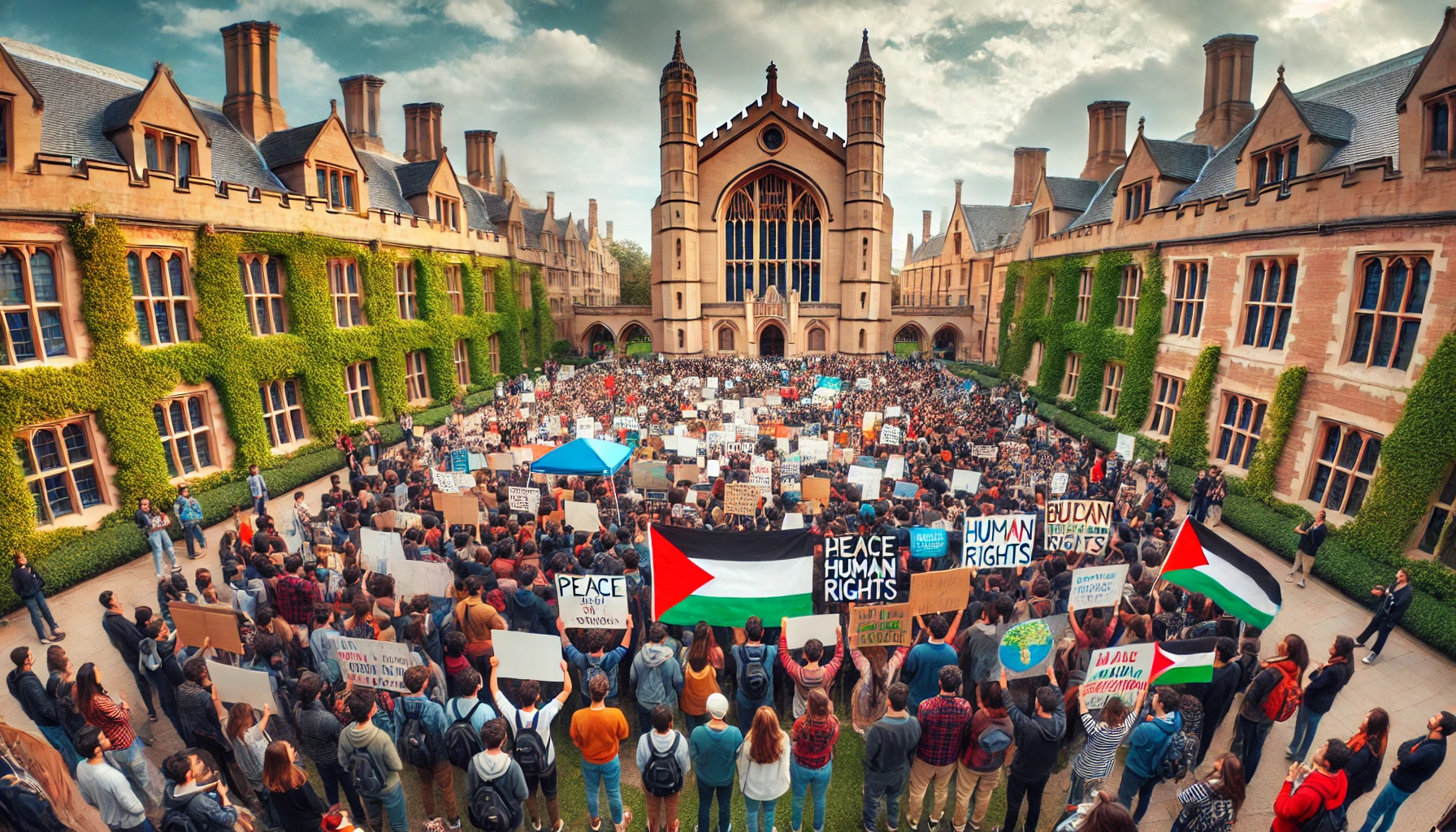Mahmoud Khalil, a student from Columbia University in New York, was arrested by U.S. immigration officers over the weekend because he helped organize protests supporting Palestine. Khalil, who is 29 years old and originally from Syria, holds a green card, which means he is legally allowed to live and work in the United States permanently. His arrest has started a big discussion about the rights of green card holders and whether their freedom of speech is protected.
President Donald Trump said, “This is the first arrest of many to come,” on his Truth Social platform. Trump described Khalil as “a radical foreign pro-Hamas student.” Khalil’s arrest is connected to protests that took place at Columbia University last year. Those protests asked universities to stop supporting companies connected to Israel and called for peace after a war in Gaza led to more than 61,000 deaths.
Before being arrested, Khalil finished his master’s degree at Columbia University. He was a leader at the protests, talking to university officials and the media. Khalil was concerned about being targeted for his views. “Clearly, Trump is using the protesters as a scapegoat for his wider agenda [of] fighting and attacking higher education and the Ivy League education system,” Khalil said in an interview.
Khalil’s lawyer, Amy Greer, says he is being targeted because of his political beliefs. Khalil has not committed any crimes, Greer said. “Because Mahmoud has been so prominent, active and outspoken in support of Palestinian rights, he’s been marked as a target,” said another lawyer, Ramzi Kassem.
The U.S. government has accused Khalil of activities that they say support Hamas, a group they consider terrorists. Karoline Leavitt, the White House press secretary, said Khalil misused his opportunity to study in America by siding with terrorists. At Columbia University, the protests led by Khalil included flyers with Hamas logos, according to the government. However, it is not clear if Khalil himself was involved in distributing these flyers.

Khalil has said his protests are not about hate. He told CNN, “As a Palestinian student, I believe that the liberation of the Palestinian people and the Jewish people are intertwined and go hand-by-hand, and you cannot achieve one without the other.” Khalil also explained, “I always say that we are the lucky ones that made it here to speak for our people who are under oppression in Palestine and across the refugee camps and the Palestinian cities.”
After his arrest, Khalil was moved from New York to a detention center in Louisiana, over 1,000 miles away from his home. His wife, a U.S. citizen, is eight months pregnant and living in New York.
Green card holders like Khalil have many rights similar to U.S. citizens, including freedom of speech. According to Georgetown Law Professor David Cole, “The First Amendment does not distinguish between citizens and non-citizens… Therefore, since you couldn’t punish a citizen for their speech, you couldn’t deport a foreign national for their speech.” However, the government has powers to remove non-citizens who commit crimes or are seen as threats to national security.
A federal judge, Jesse Furman, has now ordered that Khalil must not be deported until his court case is decided. Khalil’s lawyers are asking that he be allowed to return to New York to be with his wife before their baby is born.
This article is based on the following articles:
https://www.npr.org/2025/03/11/nx-s1-5323147/mahmoud-khalil-green-card-rights
https://www.aljazeera.com/news/2025/3/12/mahmoud-khalil-arrest-can-the-us-deport-a-green-card-holder

Background Information
Green Card (Lawful Permanent Resident Status):
A green card allows a person from another country to live and work permanently in the United States. Green card holders have similar rights to citizens, but their residency can be taken away under certain conditions, such as criminal activity or threats to national security.
Immigration and Customs Enforcement (ICE):
ICE is a U.S. government agency responsible for enforcing immigration laws. ICE officers can arrest people they suspect of violating immigration laws or who are considered threats to national security, even if these individuals legally reside in the U.S.
U.S. Constitution and Free Speech (First Amendment):
The U.S. Constitution guarantees freedom of speech to everyone living in the United States, including non-citizens. This right allows people to express their opinions publicly without fear of punishment by the government, even if those views are unpopular or controversial.
Israel-Palestine Conflict:
The conflict between Israelis and Palestinians has lasted for over 75 years, beginning in 1948 when Israel was created. Palestinians call the events of 1948 the “Nakba,” meaning catastrophe, because hundreds of thousands of Palestinians lost their homes. The conflict involves disagreements over land, politics, and rights, and has led to numerous wars, including recent fighting in Gaza, which resulted in significant deaths and widespread protests around the world.
Hamas:
Hamas is a Palestinian organization that governs Gaza and is considered by the U.S. and other countries as a terrorist group because of its violent actions against Israel. Demonstrations supporting Palestinians sometimes are mistakenly or deliberately accused of supporting Hamas, causing controversy and legal problems for protest organizers.
Deportation:
Deportation means forcing a non-citizen to leave the U.S. The government must usually provide evidence and a legal hearing before deportation. Courts must decide if the reasons for deportation are fair and legal.
First Amendment Rights:
The First Amendment of the U.S. Constitution protects freedom of speech and peaceful protest, preventing the government from punishing people based on their opinions or the things they say.
Role of Universities in Protests:
Universities like Columbia are known for their history of activism and student protests, often related to issues of human rights, international conflicts, and political debates. Such protests can become national news, especially when they involve complex or controversial issues.

Debate/Essay Questions
- Should the government have the power to deport people because of their political views? Why or why not?
- Why is freedom of speech important, and what might happen if the government limits this right for certain groups of people?
- If someone organizes a protest, should they be held responsible if others use the protest to spread messages that the organizer doesn’t support? Why or why not?
- How might this case affect other students in the U.S. who are involved in activism or protests?
Please subscribe to Insight Fortnight, our biweekly newsletter!
